FOR MEMBERS OF ELECTRIC COOPERATIVES OF MISSISSIPPI













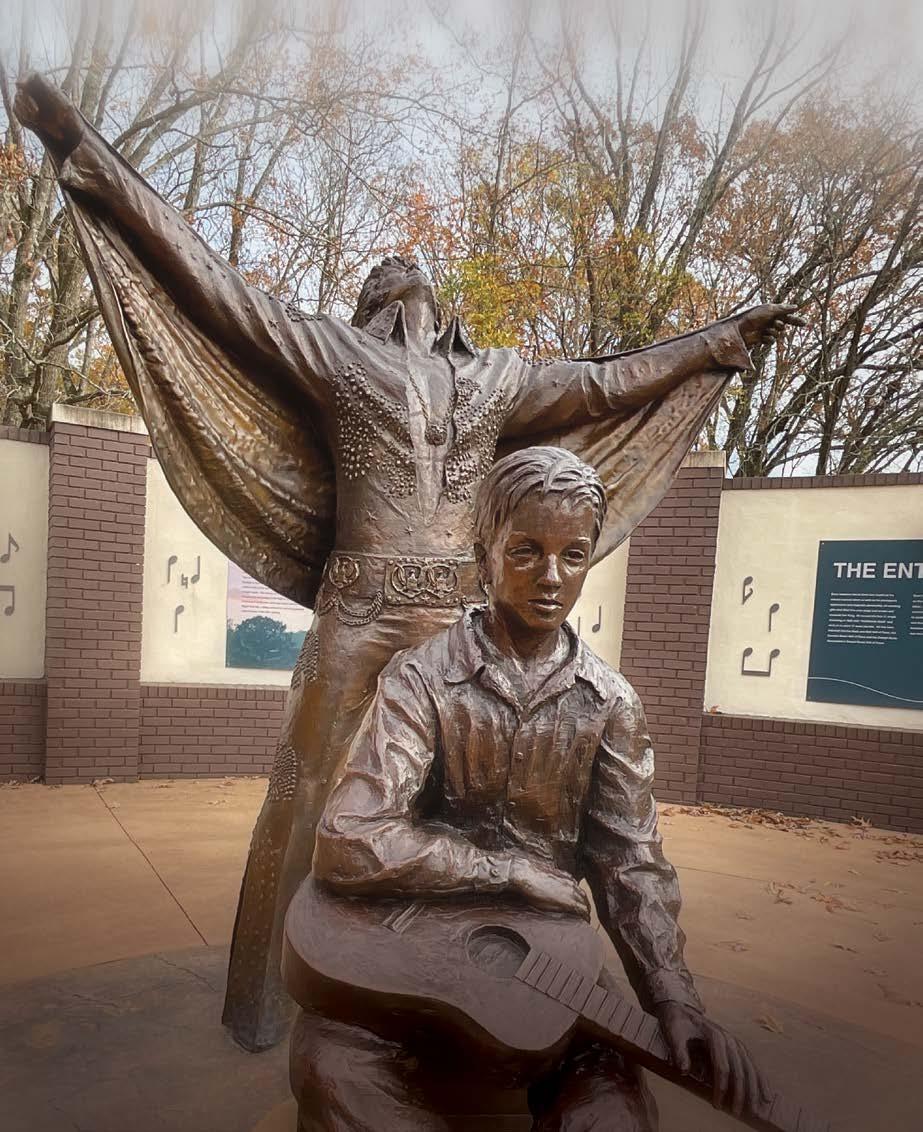
BRISKET AND LEMON PIE TO DIE FOR PICTURE THIS: FOOTBALL SEASON HOUNDING SQUIRRELS









































Jan. 3, 2023, happens to be the first Tuesday after the first Monday of January and thus, the start of the Mississippi Legislative session. For the next 90 days, my government relations team will be at the state capitol monitoring legislation and educating members of the Mississippi House and Senate, regarding the potential e ect such outcomes could have on Mississippi’s 26 electric cooperatives and their members. It just so happens that 2023 is an election year for Mississippi.
I know some of you are thinking, “Didn’t we just have an election in November?” Yes, we did, but this is Mississippi and in Mississippi, it is always an election year for some o ce! In 2022 you voted for the folks you send to Washington, D.C. In 2023, you will vote for your statewide o cials, House and Senate members, county sheri s, circuit and chancery clerks, county supervisors, right on down to your local dogcatcher. Ok, maybe not the dogcatcher, but you understand my meaning. All the folks who touch your life daily and make decisions directly a ecting you will be on the ballot.
These elections are important for determining the future course of Mississippi. Therefore, not only do we want to encourage our cooperative membership to vote, but we also want to help you become a better-informed voter. Throughout this year we will be doing interviews, both written and video, with current and potential state leaders, so you, as a voter, can understand why this person wants the job and what they intend to do should they be elected.












Check out our easy-to-use mobile app of Mississippi’s state and federal elected o cials. Look for “Mississippi Legislative Roster” in the Apple App store. An Android version is also available through Google Play.
I know some of you are Republicans, while others are Democrats, and some vote the way my father did, “I vote for the man, not the party.” That’s fine with us. We are going to be, well I cannot say fair and balanced, someone else owns that line, but let’s just say we are going to give equal opportunity to all thoughts and ideas, regardless of party, so you, as a co-op member and voter, can make an informed decision on Election Day. (Whoa, flashback to my days of practicing law!)

“One of the penalties for refusing to participate in politics is that you end up being governed by your inferiors,” is a quote often attributed to Plato. As someone who has run for and won public o ce, I understand that not everyone has the desire or attributes to be a politician. But voting is a form of participation, and every qualified man and woman in Mississippi should not only cast their vote, but care enough to understand who they are voting for and why.
My goal in 2023 is to make that easier for you to do.
Enjoy our January issue.
by Michael Callahan
True to the heart of the music as it rings in the earth’s atmosphere.
The melody blues moving into the movement with an unforgettable rhythm and blues.

Bringing the flow of love as it lifts the soul of the people.
As it’s dashing by, they will never forget My Mississippi.
What’s Mississippi to you?
What do you treasure most about life in our state? Send your brief thoughts to Today in Mississippi, news@ecm.coop or mail to P.O. Box 3300, Ridgeland, MS 39158

Submit your beautiful digital photo of life in Mississippi to Today in Mississippi, news@ecm.coop


The Official Publication of the Electric Cooperatives of Mississippi
Vol. 76 No. 1
OFFICERS

Randy Carroll - President
Ron Barnes - First Vice President
Tim Perkins - Second Vice President
Brian Hughey - Secretary/Treasurer
Michael Callahan - Executive Vice President/CEO
EDITORIAL STAFF
Lydia Walters - VP, Communications
Steven Ward - Editor
Chad Calcote - Creative Director/ Manager
Kevin Wood - Graphic Designer
Alan Burnitt - Graphic Designer
Courtney Warren - Graphic Designer
Chris Alexander - Member Services Coordinator
Steve Temple - Social Media Director
Mickey Jones - Administrative Assistant
EDITORIAL OFFICE & ADVERTISING

601-605-8600
Acceptance of advertising by Today in Mississippi does not imply endorsement of the advertised product or services by the publisher or Mississippi’s electric power associations. Product satisfaction and delivery responsibility lie solely with the advertiser.

• National advertising representative: American MainStreet Publications, 800-626-1181
Circulation of this issue: 482,018
Non-member subscription price: $9.50 per year.
Today in Mississippi (ISSN 1052-2433) is published 12 times a year by Electric Cooperatives of Mississippi Inc., P.O. Box 3300, Ridgeland, MS 39158-3300, or 665 Highland Colony Parkway, Ridgeland, MS 39157. Phone 601-605-8600. Periodical postage paid at Ridgeland, MS, and additional office. The publisher (and/or its agent) reserves the right to refuse or edit all advertising.
POSTMASTER: Send all UAA to CFS. (See DMM 507.1.5.2)
NON-POSTAL AND MILITARY FACILITIES: send address corrections to: Today in Mississippi, P.O. Box 3300, Ridgeland, MS 39158-3300 www.facebook.com/TodayinMississippi www.todayinmississippi.com



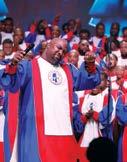
This month marks the 75th anniversary of the statewide publication of Mississippi’s electric cooperatives.
The first issue of Mississippi Rural Light & Power came out in January 1948. That publication became Rural Electric News in March 1950. The name was changed to Mississippi Rural Electric News in February 1962, and then Mississippi EPA News in October 1963. The name Today in Mississippi arrived in 1990.




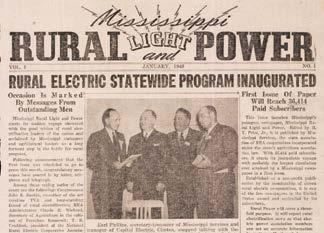

The publication was a newspaper for years until Today in Mississippi was transformed into a glossy magazine, debuting its new format with the September 2019 issue.


With a print circulation of close to half a million readers, Today in Mississippi has the largest print circulation of any publication in the state.















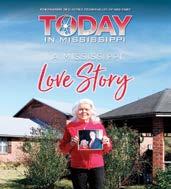







Many gardeners consider winter a less interesting outdoor season compared to the warmer spring and summer seasons.
To add color, we depend on cool-season annuals like dianthuses, pansies, violas, and the various kales and cabbages. Of course, we’re also entering camellia season, but that’s really about it.

Until we’re surprised by a forgotten landscape plant that’s about to burst into action from nowhere.
Winter cassia, known botanically as Senna bicapsularis and sometimes Cassia bicapsularis, is not a common landscape plant. It’s a tropical plant with yellow flowers that resemble golden butterflies, causing it to sometimes be called butterfly bush.





Be sure to plant your winter cassia in a full-sun location for the best growth and flower production. We planted some at the Mississippi State University Coastal Research and Extension Center in Biloxi along our service drive in partial shade, and these plants did not flower reliably and eventually did not survive.
Good drainage is a must, as cassia do not like wet feet. They also do not tolerate droughty soil conditions.
Winter cassia is hardy in the coastal Mississippi counties.
It is common for this landscape plant to die back to the ground during extreme cold snaps on the coast. A layer of mulch is a good idea once nighttime temperatures start dipping into the 30s.
Winter cassia is one of those show-stopping plants, especially considering the prolific blooms it produces in the winter. The e ect is heightened because the brightly colored blooms seem to appear out of nowhere.
I still remember moving to Mississippi 15 years ago and being astonished when I saw my first winter cassia.
The golden-yellow flowers are displayed in loose clusters, each having up to 12 individual blossoms. Each individual flower has five petals. The curved shape of the stamens and pistil give it the butterfly appearance.
The large flower clusters, which form toward the ends of the slender branches, can be so heavy that the branches are pulled down, giving many plants a distinctive vase-shaped form. This e ect can be accentuated after a rain or heavy dew.
The leaves are pinnately compound with three to five pairs of ovalshaped leaflets. The foliage is a deep green in the summer, but with falling temperatures, these leaflets display a greenish-yellow tint.

While the leaf shape and color do have landscape interest all year, winter cassia primarily fills in garden gaps and provides a consistent backdrop for more showy summer plants.
That said, there are some nice large specimens — up to 8 feet by 8 feet — to be found growing in protected microclimates along the coast. In more northern Mississippi counties, I believe winter cassia could be grown in large containers, so the plant can be moved into winter protection.
Winter cassia is a landscape plant that deserves more attention in our Mississippi landscapes.








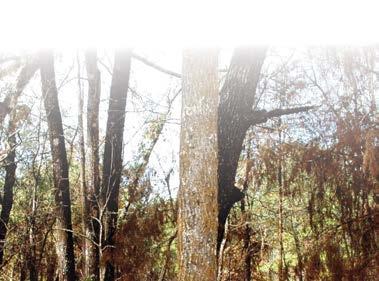
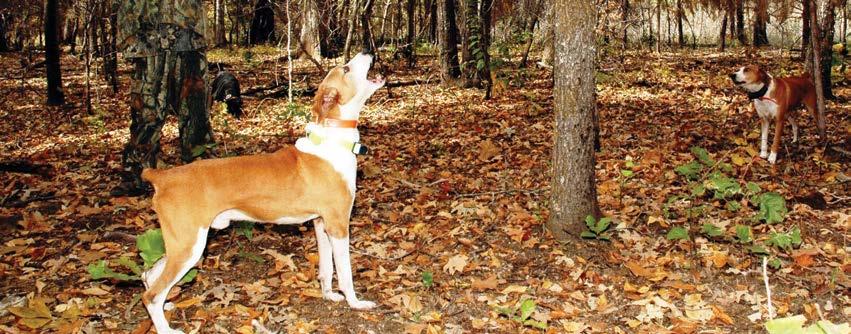
Minutes after they bolted from the truck kennel, the dogs started barking hysterically a couple hundred yards away before we could even load our guns.

We rushed to the sound as fast as we could. Beneath a tree, dogs jumped and barked at their unseen quarry perched somewhere high in a white oak. We positioned ourselves around the tree looking up into its leafy branches. The “gray ghosts of the forest” can easily disappear anywhere in a tree.
“I’m going to shake some vines going up into the tree to see if the squirrel will move,” advised one of our companions. “Get ready. It might come out running.”
After our partner shook the vines, three gray blurs rocketed from cover and scattered in different directions. Watching the ruckus and our poor marksmanship, the dogs chased after the bushytails, possibly to tree them again.
“Hunting squirrels with dogs is an old tradition in Mississippi,” said Mark Beason, who learned to hunt squirrels with dogs from his grandfather. “It goes back a long time. I grew up hunting squirrels with dogs.”

Most squirrel hunters stalk quietly through forests, pausing periodically to stop, look and listen, but hunting with dogs seems more like a rowdy cross-country steeplechase than a stalk. Dog handlers release one or two animals at a time and swap them out periodically throughout the day to avoid excessively tiring them. Humans, on the other hand, must keep up with the boisterous energetic creatures as best as they can while running up hills, down ravines, across creeks and through swamps.
Most dog hunters enjoy watching and listening to their animals more than shooting at squirrels. An experienced handler knows when a dog crosses a hot scent, sees, or trees a squirrel by the sound it makes. When hunting with more than one dog, handlers can distinguish the unique sounds of their individual animals from the cacophony of chaos surrounding a tree, even from great distances.
By late winter, most of the acorns and other squirrel foods dropped to the ground already. Therefore, squirrels spend more time foraging on the ground. That leaves more scent for dogs to follow.
Mississippi sportsmen can hunt two squirrel species, gray and fox squirrels, and two subspecies of fox squirrel. The Bachman, or “hill country” fox squirrel, prefers upland forests. The delta fox squirrel primarily lives in thick mature hardwood bottoms along the Mississippi River. Fox squirrels can come in variations of white, black, and red coloration with some almost entirely black, possibly with white ears or noses.
When hunting with dogs, sportsmen can talk and move around rather than remain still and quiet. Some dog fanatics even engage in a little friendly bantering over whose dog treed the first, fastest and most squirrels.

With more action and less need for quiet, chasing squirrels with dogs offers an exciting way to introduce children or novices to hunting. On a good morning, youngsters can probably fire more shots than sitting in a deer stand all season.
by John N. Felsher
In a milestone for the years-long Asylum Hill Project, a team of

remains last fall on the campus of the University of Mississippi Medical Center. Their work commenced in November on a section of land holding
were residents of the vanished State Hospital for the Insane which
Medical Center ground.
It’s a major phase in the ongoing mission to unearth, study,

















patients whose bodies were never claimed, as UMMC o
site for potential land development.


Equipment used to remove the remains includes a track hoe, which has a digging arm. Its operator carefully scrapes away the top layer of soil over the burial ground, just inches at a time, until the soil’s appearance changes, indicating the presence of interments beneath.

“The contractor, who is from Mississippi, specializes in this type of archaeological machine excavation,” said Dr. Jennifer Mack, lead bioarchaeologist for the undertaking.

A team of several archaeologists, including Mack and scholars drawn from locations such as Florida, Georgia, Ohio, and the Mississippi Gulf Coast will do the rest by shovel and hand.
Also clearing the way for the excavations was the removal of trees over an approximately four-acre section of the project area.
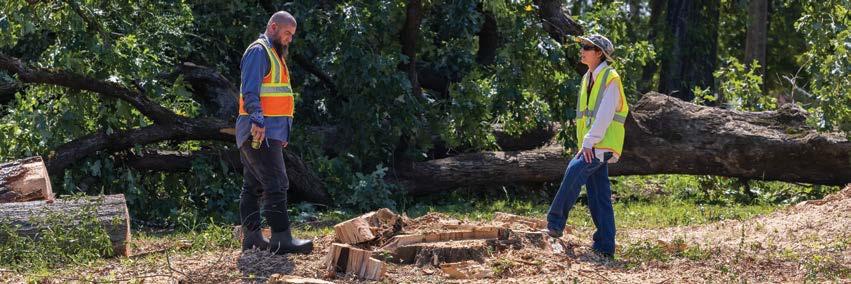
As work proceeds, the experts cannot be sure how deep the graves lie. Thanks to geophysical surveys and other means, they have been able to estimate that as many as 7,000 graves constitute the asylum cemetery. The first co n discovered, in late 2012, was about one foot deep.
Mack estimates that the ones about to be uncovered will be four or five feet down.
Originally named the Mississippi State Lunatic Asylum, the institution served about 30,000 patients between 1855 and 1935. The thousands of residents who died were buried with wooden markers which deteriorated and disappeared over time.
Thanks to geophysical surveys and other means, they have been able to estimate that as many as 7,000 graves constitute the asylum cemetery. The first coffin discovered, in late 2012, was about one foot deep.
A list of asylum patients who were buried in the cemetery between 1912 and 1935 is available; but, without markers, no one knows exactly where each one lies.

In July, Mack and Gibson held a virtual seminar to inform UMMC employees about the archaeological work funded, so far, by $3.7 million from the State Legislature. In addressing some misconceptions, they said:
• There is no reason to think that the asylum dead were buried in mass graves. Ground-penetrating radar and other means have revealed the presence of individual grave shafts.

• There is no risk of biohazard contamination.
• The graves will not be bulldozed.
“As we excavate, we are also looking at co n materials, personal items such as buttons and pins,” Mack said during the presentation. “They will be documented; each item could potentially help narrow down a burial date, and could therefore help with identification.”
They will gather osteo-biographical sketches as well: age, sex, ancestry, height, past illness, trauma, etc. Those details can help whittle down the list of candidates for potential identification.



“This will allow us to tell a person’s story,” Mack said. “Even if no name is found, we can rescue the individual from the anonymity imposed by the grave.”
Gibson has been in contact with about 150 descendants of patients. They have been kept abreast of Asylum Hill’s progress and have been invited to participate in virtual question-and-answer sessions about the excavations and to contribute oral histories and other information through the project’s website.
Many of the patients committed to the asylum may not have had a mental illness, Gibson said. “What was considered mental illness then is not always considered mental illness today. Some of those conditions are treatable now.”
Why would a family not claim a body? Transportation and communication were issues, Mack said. Documentation shows that hospital o cials tried to contact families, but there was no refrigeration then. So, they were buried, if not claimed, within 24 hours.
So far, 66 graves have been excavated – those uncovered after a construction crew discovered a single pine co n a decade ago.



It may take five to seven years to disinter the remaining thousands and accomplish other aims. Another goal, when funding becomes available, is to create a memorial and laboratory that will serve as a permanent resting place for those who could not be positively identified and returned to their families for reburial.
Those buried represent every county in the state; at least half are African Americans, Mack said.
“We continue to work with a community advisory board, answering people’s questions about their ancestors. This process truly serves the people all over Mississippi.”
This will allow us to tell a person’s story. Even if no name is found, we can rescue the individual from the anonymity imposed by the grave.
The memories of your loved one live on in your heart, always with you, and just a cherished memory away. Our exclusive “Until We Meet Again” Diamond Ring is a loving tribute and a radiant symbol that keeps your special loved one always by your side. Our unique ring features a ribbon engraved with the word “Always” wrapping around a split-style band handcrafted in solid sterling silver which is enhanced with a fine layer of rhodium plating for maximum shine and beauty. A genuine diamond sparkles at the center of the word “Always”, and 10 additional diamonds enhance the band. Inside the ring is elegantly engraved “Until We Meet Again”.





Not Available in Stores... Order Today! Available in women’s whole and half sizes 5-12, this stunning ring can be yours for just $119.99*, payable in 4 easy installments of $30.00. Your ring arrives in a custom presentation case with a poem card and a Certificate of Authenticity, backed by our unconditional 120-day guarantee. To reserve, send no money now; just mail your Priority Reservation today!

The Bradford Exchange P.O. Box 806, Morton Grove, IL 60053-0806




Like millions of older Americans, I struggle with mobility. For years, I watched my quality of life slip away, as I was forced to stay home while friends and family took part in activities I’d once enjoyed. I thought I’d made some progress when I got a mobility scooter, but then I realized how hard it was to transport. Taking it apart and putting it back together was like doing a jigsaw puzzle. Once I had it disassembled, I had to try to put all of the pieces in the trunk of a car, go to wherever I was going, and repeat the process in reverse. Travel scooters were easier to transport, but they were uncomfortable and scary to drive, I always felt like I was ready to tip over. Then I found the So LiteTM Scooter. Now there’s nothing that can hold me back.




Years of work by innovative engineers have resulted in a scooter that’s designed with seniors in mind. They created Electronic Stability Control (ESC) that makes it virtually impossible to tip over. If you try to turn too quickly, the scooter automatically slows down to prevent it from tipping over. The battery provides powerful energy at a fraction of the weight of most batteries. With its rugged yet lightweight aluminum frame, the So LiteTM Scooter is the most portable scooter ever—but it can hold up to 275



pounds—yet weighs only 40.8 pounds without the battery! What’s more, it easily folds up for storage in a car seat, trunk or even on an airplane. It folds in seconds without tools and is safe and reliable. Best of all, it’s designed with your safety in mind, from the newest technology and superior craftsmanship. Why spend another day letting your lack of mobility ruin your quality of life? Call now and find out how you can get a So LiteTM Scooter of your very own.







You are a man of the wilderness. The only plan you have is to walk up that mountain until you feel like stopping. You tell your friends that it’s nothing personal, but this weekend belongs to you. You’ve come prepared with your River Canyon Bowie Knife sheathed at your side. This hand-forged, unique knife comes shaving sharp with a perfectly fitted hand-tooled sheath. The broad stainless steel blade shines in harmony with the stunning striped horn, wood and bone handle. When you feel the heft of the knife in your hand, you know that you’re ready for whatever nature throws at you.
This knife boasts a full tang blade, meaning the blade doesn’t stop at the handle, it runs the full length of the knife. According to Gear Patrol, a full tang blade is key, saying “A full tang lends structural strength to the knife, allowing for better leverage ...think one long steel beam versus two.”
With our limited edition River Canyon Bowie Knife you’re getting the best in 21st-century construction with a classic look inspired by legendary American pioneers. What you won’t get is the trumped up price tag. We know a thing or two about the hunt–– like how to seek out and capture an outstanding, collector’s-quality knife that won’t cut into your bank account. This quintessential knife can be yours to use out in the field or to display as the art piece it truly is. But don’t wait. A knife of this caliber typically cost hundreds. Priced at an amazing $49, we can’t guarantee this knife will stick around for long. So call today!
BONUS! Call today and you’ll also receive this genuine leather sheath!



What customers are saying about Stauer knives...








Your satisfaction is 100% guaranteed. Feel the knife in your hands, wear it on your hip, inspect the craftsmanship. If you don’t feel like we cut you a fair deal, send it back within 30 days for a complete refund of the sale price. But we believe that once you wrap your fingers around the River Canyon’s handle, you’ll be ready to carve your own niche into the wild
“First off, the shipping was fast and the quality is beyond what I paid for the knife. Overall I am a satisfied customer!” — D., Houston, Texas
Once again, I failed to watch the old year leave and usher in the new. I had faith it would happen without me. After all, 2021 was a year with significant improvement over 2020. I have faith that 2023 will be an improvement over the last year as well.
Northcentral Connect, our high-speed internet a liate, has had a slow but steady deployment. As we set our eye on 3,000 subscribers, we are working strategically on ways to speed up supply chain and labor issues. Our community deserves a ordable, reliable, high-speed internet service to enhance the quality of life in our area. 3,000 isn’t that bad, but we hope to see that number double in the next year.

Distribution plan upgrades continue as we see robust residential and large-scale commercial growth throughout our system. This increased investment not only provides power to our new consumers but also provides greater reliability for our existing members in the community.
Planning for the unplanned is continuous. We’d prefer to not see an ice storm like we did in February of last year but realizing the threat will have us better positioned to o er even quicker restoration times than we saw then. High-speed


internet and servicing growth is important, but, at the end of the day, maintaining quality electric service in the community remains a priority.

Don’t confuse me with a futurist, but I am an optimist. The new year will be an improvement over 2022 in many areas. We at Northcentral will reflect on the past two years and take it as an opportunity to excel. I love the quote from the movie “Forrest Gump,” “Don’t you just love New Year’s? You get to start all over.” We don’t require a “start over” at Northcentral. Instead, we look forward to an energized REstart moving into 2023.
Happy New Year.

Happy Birthday Elvis. Stay safe.
 by Kevin Doddridge General Manager/CEO
by Kevin Doddridge General Manager/CEO































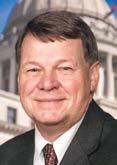
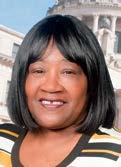
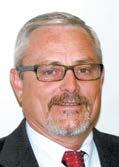


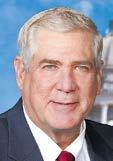


 Rep. Steve Massengill District 13: Benton, Lafayette, Marshall, and Union counties Years in Legislature: 12
Rep. Steve Hopkins District 7: DeSoto County Years in Legislature: 8
Rep. Dan Eubanks District 25: DeSoto County Years in Legislature: 8
Rep. Jeff Hale District 24: DeSoto County Years in Legislature: 8
Rep. John T. (Trey) Lamar III District 8: Lafayette and Tate counties Years in Legislature: 12
Rep. Dana Criswell District 6: DeSoto County Years in Legislature: 8
Rep. John Faulkner District 5: Benton, Lafayette, Marshall, and Tate counties Years in Legislature: 11
Rep. Jerry Darnell District 28: DeSoto County Years in Legislature: 4
Rep. Steve Massengill District 13: Benton, Lafayette, Marshall, and Union counties Years in Legislature: 12
Rep. Steve Hopkins District 7: DeSoto County Years in Legislature: 8
Rep. Dan Eubanks District 25: DeSoto County Years in Legislature: 8
Rep. Jeff Hale District 24: DeSoto County Years in Legislature: 8
Rep. John T. (Trey) Lamar III District 8: Lafayette and Tate counties Years in Legislature: 12
Rep. Dana Criswell District 6: DeSoto County Years in Legislature: 8
Rep. John Faulkner District 5: Benton, Lafayette, Marshall, and Tate counties Years in Legislature: 11
Rep. Jerry Darnell District 28: DeSoto County Years in Legislature: 4
At Northcentral’s Annual Meeting of the Members on Oct. 26, Kimberly Gordon was elected to the Board of Directors for the cooperative. Gordon will serve the members of District 7, which covers southern Marshall County and portions of Tate and Lafayette Counties.
A resident of Tate County, Gordon has been a self-employed hairdresser for over 30 years. She is also a forklift operator with FedEx Freight, where she has been employed for 10 years.
Gordon and her husband Randy have four daughters. In addition to spending time with their 10 grandchildren, they enjoy fishing and camping.
When asked about her motivation to vie for the open board seat, Gordon said, “I have always been interested in the industry. My husband’s grandfather retired from the Tennessee Valley Authority and worked in Batesville during his career. After praying about the opportunity, I am excited to serve and eager to learn as much as I can about the industry.”
It is said that every decision in the electric cooperative world is made with the member at the end of the line in mind. With Kimberly Gordon living at the southernmost part of the Northcentral service area, you can take comfort in knowing that, in fact, a member “at the end of the line” is helping to make those decisions.

After 18 years of service to the members of Northcentral Electric Cooperative, Joan Childress resigned her position on the Board of Directors when she relocated from rural Marshall County to Southaven.


Childress was elected to the board in August 2004, to represent members of District 7, which covers southern Marshall County and portions of Tate and Lafayette Counties. In her service she brought nearly 30 years of expertise in information technology working for FedEx, where she provided technical support to their marketing, accounting, and legal departments before retiring in 2015.
During her time on the board, Childress helped guide the cooperative through many changes and rapid growth, including the consolidation and relocation of Northcentral facilities to a newly constructed campus in Olive Branch. She was also instrumental in the decision to form our fiber internet subsidiary, Northcentral Connect. The decision to move operations to Olive Branch was a di cult one. “At the time, I didn’t like the idea of leaving Byhalia. In the end, it was a good decision seeing how fast the cooperative and the service area was growing,” said Childress.
When asked about her thoughts on her time on the board, Childress spoke fondly of the cooperative’s leadership and employees. “Everyone works so well together to serve the members. Leadership has great engagement with employees, and the board has always gotten along to reach a common goal. We always voted how we felt but supported one another even when we disagreed.”
In retirement, Childress gives her time volunteering with Hearts and Hands Ministries in Byhalia and will soon begin volunteer work with the DeSoto County Dream Center. She now intends to “enjoy life more,” which consists of traveling, playing piano, and most importantly spending time with her grandchildren.
At the cooperative’s Annual Meeting of the Members on Oct. 26, Attorney James Woods read a board resolution thanking Childress for her years of dedicated service to Northcentral Electric Cooperative.
Joan Childress Kimberly GordonLast year saw a record increase in electric vehicle (EV) sales, and experts are predicting that by 2035, many major vehicle manufacturers will only produce electric models.





A 2021 study by the Department of Energy showed that increased electrification, or replacement of direct fossil fuel use with electricity, would account for a 38% increase in electricity demand by 2050 — and EVs will play a major role in this increased electrification.
Electric cooperatives are currently identifying ways to manage this new pattern of electricity use, though exact strategies will vary based on each utility’s unique needs. Analyzing energy load patterns or identifying where and when the local grid has spikes in demand can provide electric co-ops with data on where to place higher-capacity transformers. This analysis can also provide a picture of overall energy use and patterns to help forecast energy consumption for the future. Planning system maintenance and upgrades are also part of that long-range forecasting; however, this has been recently complicated by supply-chain issues with transformers, with wait times that are upwards of one year.

EV owners can play a role in reducing energy costs and system stress associated with charging. Check with your local electric co-op to see if they o er an EV charging rate. Typically, an EV rate incentivizes charging during the night, when electricity demand and wholesale energy rates are lower. Charging at night is also a great way to ease demand in your neighborhood, even without a special EV rate.
The need for more electricity will have a major impact on the nation’s grid, which means power supply and grid infrastructure must be carefully planned to accommodate the increased need for electricity.



EV charging presents new challenges in maintaining the electric grid. Fully charging an EV battery requires the same amount of electricity needed to power a home during peak energy use times. However, EV charging is a concentrated pull of energy over an extended period, which can add stress to the local power grid by increasing the amount of electricity a utility has to provide. Additionally, the neighborhood transformer needs adequate capacity to handle the increased load. EV charging can shorten the lifespan of transformers by straining and overloading their capacity if they are not matched to a neighborhood’s energy needs.
Another potential change on the horizon is a new energy peak time. EV drivers that plug-in to charge as soon as they return home from work would create even more electricity demand during this busy time of day. But if EV drivers use a timer to schedule charging at night, the electricity demand could be spread over a longer period to reduce stress on the grid. This would be especially beneficial for neighborhoods with multiple EV drivers.


EVs are only expected to increase in number. Electric co-ops and EV owners both have roles to play in accommodating increased demand. If you own an EV, let your electric co-op know so they can better plan energy demand for you and your neighbors.















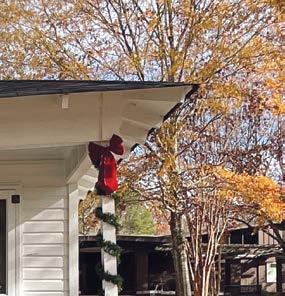

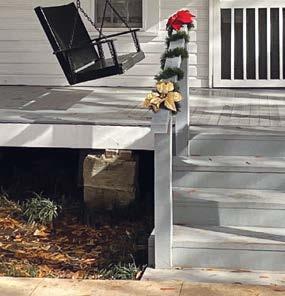









If you’ve ever visited Graceland in Memphis and thought Elvis Presley’s longtime home was gaudy, overly grand, or even pretentious, it all makes sense when you start at the beginning.
Elvis Presley was born in a tiny, 300-square-foot, two-room house in Tupelo that his father, Vernon, and his uncle, Vester, built with $180. Vernon Presley had to borrow the $180 from his employer.
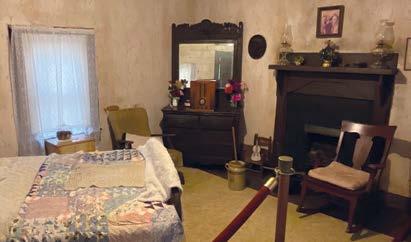
The home was built in 1934. Elvis was born on Jan. 8, 1935. Had he lived to 2023, The King of Rock and Roll would have turned 88 this month.
Roy Turner, the executive director of the Elvis Presley Memorial Foundation and head of The Elvis Presley Birthplace Park in Tupelo, said he believes the best way to tackle the history of Elvis is to start at Chapter 1.
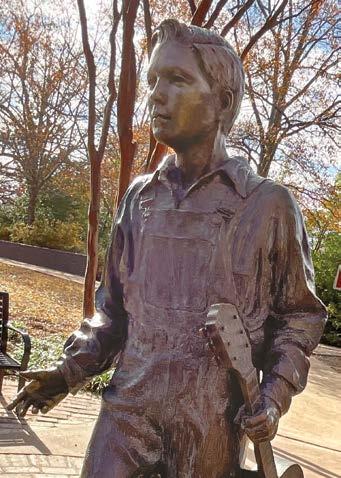
“Because this is how it all began. Come here first and then go to Graceland,” Turner, 70, said on a recent Friday at the park.
That’s exactly how Scottish sisters Geri Forbes, 59, and Edna Clark, 64, approached their recent trip to America to investigate the life of their favorite singer.
Forbes and Clark — who live in Glasgow — planned their international trip to celebrate Forbes’ 60th birthday. The pair was walking around the park on a Friday and were slated to visit Graceland on the following Sunday.
“I’m so glad you did it this way and get to see his birthplace first,” Turner told the sisters after meeting them near the “Elvis at 13” statue.

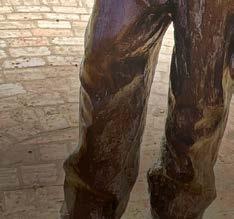
Forbes and Clark’s mother was a huge Elvis Presley fan and played his music constantly when they were growing up in Glasgow.
amazing. The trip of a lifetime for us,”
“This has been amazing. The trip of a lifetime for us,” Forbes said.

Turner said visitors from Scotland were the norm. On the same day, a family from Liverpool, England was also touring the park.
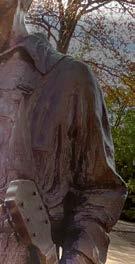
Turner said the park sees between 60,000 to 80,000 visitors a year with half of that amount coming from other countries.

Sisters and lifelong Elvis fans Edna Clark (left) and Geri Forbes visited the park on a recent Friday on a trip from Glasgow, Scotland.

The Elvis Presley Birthplace Park consists of the house, a museum, a chapel, a gift shop, the “Elvis at 13” statue, the “Elvis Becoming” statue, The Fountain of Life, The Walk of Life, a “Memphis Bound” car feature, a story wall, a theatre, picnic pavilion, amphitheater, and the Assembly of God Church.
There would probably be no Elvis Presley without that church.
The church was where Elvis was first exposed to traditional, Southern Pentecostal gospel music as a child.
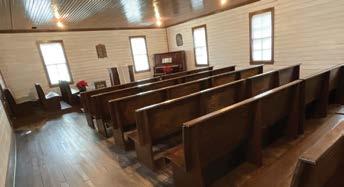


A minister at the church, Brother Frank Smith, taught Elvis how to play D, A and E chords on his first guitar, Turner said. Elvis sang his first gospel song “Jesus Loves Me” as a child in that same church.
The church was moved from its original location to the park.
A mixture of white gospel music, black gospel, Mississippi blues, and the country music Elvis grew up on while listening to the Grand Ole Opry on the radio on Saturday nights, set the musical template for Elvis’s brand of rock and roll.

The most popular site at the park is the home where Elvis was born.
The City of Tupelo bought the home and surrounding property in 1957. Elvis wanted a park for the neighborhood children and donated the proceeds from a 1957 concert at the Tupelo Fairgrounds for the park. The house is in its original location and has been restored to its original condition with period furniture.
Turner said Elvis was born in the house and lived there until he was 3.
The family was kicked out of the house because Vernon Presley had to go to prison. Vernon Presley served nine months at Parchman Penitentiary on forgery charges but was later pardoned.
The Presley family moved around in Tupelo after that and then, eventually, to Memphis, where they lived in di erent homes until moving into Graceland.

Turner said the last time Elvis visited his hometown was in 1971.
“When Elvis was married to Priscilla, they came to Tupelo five times — usually on a Sunday. They would drive around and look at Elvis’s childhood haunts,” Turner said.
Turner grew up in east Tupelo and went to the same school Elvis did.
Turner never met Elvis but was a fan — not a super fan — of his music and movies growing up.
Obsessed instead with Marilyn Monroe, Turner became the local Elvis historian after a visit with a British author who came to Tupelo in 1981 to write an Elvis Presley biography.
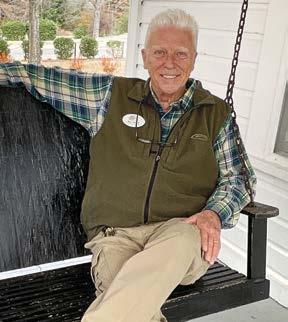
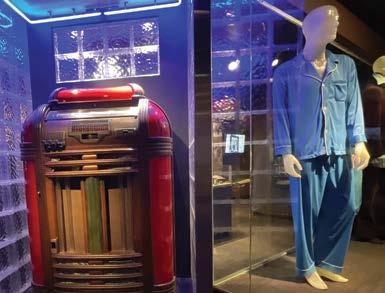
Elaine Dundy moved to Tupelo for five months to write a book about Elvis. She needed a local on the ground to help her with research and history. Someone gave her Turner’s name.
“I love history and genealogy research. So, she hired me to help her with the book,” Turner said.

Dundy published the book “Elvis and Gladys” in 1985.
From that time on, Turner was the Elvis go to guy in Tupelo.
In 2001, Dundy told Turner she was getting older and wanted to set up a charitable trust in Tupelo to “expose all the little elvises to the arts,” he said.
Dundy died in 2008, and in 2009, The Elaine Dundy and Roy Turner Endowment for the Arts was created.


Turner was named executive director of the Elvis Presley Memorial Foundation in 2021.
“Getting to come here every day? It’s not a job. Are you kidding? This isn’t work. This is wonderful,” Turner said.
Getting to come here every day?
It’s not a job. Are you kidding? This isn’t work. This is wonderful.
For more information about the Elvis Presley Birthplace Park, visit elvispresleybirthplace.com or call 662-841-1245

 The Elvis Presley Memorial Chapel was built with donations from fans because Elvis dreamed of having a place to meditate at the park.
Roy Turner
The Elvis Presley Memorial Chapel was built with donations from fans because Elvis dreamed of having a place to meditate at the park.
Roy Turner
Throughout the ages, there have been many important advances in mobility. Canes, walkers, rollators, and scooters were created to help people with mobility issues get around and retain their independence. Lately, however, there haven’t been any new improvements to these existing products or developments in this field. Until now. Recently, an innovative design engineer who’s developed one of the world’s most popular products created a completely new breakthrough . . . a personal electric vehicle. It’s called the Zinger, and there is nothing out there quite like it.
“What my wife especially loves is it gives her back feelings of safety and independence which has given a real boost to her confidence and happiness! Thank You!”
–Kent C., California


The first thing you’ll notice about the Zinger is its unique look. It doesn’t look like a scooter. Its sleek, lightweight yet durable frame is made with aircraft grade aluminum so it weighs only 47.2 lbs. It features one-touch folding and unfolding – when folded it can be wheeled around like a suitcase and fits easily into a backseat or trunk. Then, there are the steering levers. They enable the Zinger to move forward, backward, turn on a dime and even pull right up to a table or desk. With its compact yet powerful




Available
motor it can go up to 6 miles an hour and its rechargeable battery can go up to 8 miles on a single charge. With its low center of gravity and inflatable tires it can handle rugged terrain and is virtually tip-proof. Think about it, you can take your Zinger almost anywhere, so you don’t have to let mobility issues rule your life.
Why take our word for it? Call now, and find out how you can get a Zinger of your very own.
















































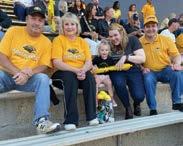







1.

2.
5.
 with Martha Hall Foose
with Martha Hall Foose
Jackson has seen legendary rhythm and blues artists pass through, such as Little Milton, Bobby “Blue” Bland, Johnny Taylor, Dorothy Moore, Z Z Hill, and Denise LaSalle. Performing at clubs like the Hidden Agenda, Queen of Hearts, George Street Grocery, Freddie B’s Hideaway, Hal and Mal’s, and the basement club of a defunct hotel, the Subway Lounge, they kept the music scene thriving in the capital city.




The Tangents, known as the “House Band of the Delta,” occasionally rolled into town to stir up trouble. My mother made this brisket for them once and had me deliver it over to “Blues Central,” the nickname for a midtown flophouse frequented by musicians, back when I was in high school. She thought the guys in the band were looking a little peaked and thin. That gesture instilled in me the value of caring for and feeding musicians. This brisket is the perfect dish for anybody who works the night shift.


(Serves 6)
2 medium onions, cut into 1-inch-thick rounds
1 (5- to 6- pound) piece flat end beef brisket, with fat cap intact, tenderized
2 tablespoons natural liquid smoke seasoning
½ cup Worcestershire sauce
2 teaspoons celery salt
1 teaspoon sweet paprika
1 teaspoon garlic powder
1 teaspoon freshly ground black pepper
Choose a glass baking dish or lidded casserole large enough to comfortably hold the meat. Arrange the onion rounds in the bottom of the dish, then place the brisket fat side up on top of the onions. Pour the smoke flavoring and Worcestershire sauce over the meat. Sprinkle the celery salt, paprika, garlic powder, and pepper over the surface. Cover tightly with plastic wrap and marinate in the refrigerator for 24 hours. Preheat the oven to 200 degrees. Remove the plastic wrap and cover the baking dish tightly with a lid or foil. Bake for 1 hour. Uncover and bake for an additional 5. Remove the brisket from the oven, and as hard as it seems, do not taste it. Allow to cool to room temperature. Cover and refrigerate for 5 hours. Preheat the oven to 325 degrees. Remove the cover and spoon o the fat that has solidified on the surface of the juices. Remove the brisket from the liquid and wrap it in foil. Pour the juices into a small saucepan. Place the foil-wrapped brisket in the baking dish in the oven and warm through, about 15 minutes. Simmer the pan juices and reduce to a thin, sauce-like consistency. Thinly slice the brisket diagonally across the grain. Serve with the sauce.
Sweetened condensed milk has a wondrous effect on eggs and citrus juice. Lemon icebox pie is a perfect example.

(Makes one 9-inch pie)
1 ½ cups graham cracker crumbs
¼ cup granulated sugar
½ teaspoon ground cinnamon
½ cup (1 stick) unsalted butter, melted
2 (14-ounce) cans sweetened condensed milk
4 large egg yolks
1 teaspoon grated lemon zest
½ cup fresh lemon juice
2 cups heavy cream
6 tablespoons confectioners’ sugar
Preheat the oven to 350 degrees. In a medium bowl, combine the crumbs, granulated sugar, cinnamon, and melted butter. Pat into a 9-inch deep-dish pie pan and bake for 6 to 8 minutes, or until slightly browned. Remove to a wire rack to cool. Meanwhile, in a large bowl, whisk together the milk, yolks, lemon zest, and lemon juice. Pour the lemon filling into the cooled crust. Bake for 10 minutes, until set. Cool on a rack. Chill the pie for 30 minutes. When the pie is completely cooled, whip the cream with the confectioners’ sugar until sti peak. Mound the whipped cream on top of the pie and chill for 1 hour.
If making the pie to serve the next day, 1 teaspoon of gelatin may be dissolved in 2 tablespoons water and added to the whipped cream just before it reaches a sti peak. To help the cream whip, have the cream, bowl, and beaters and whisk very cold. Set the beaters and bowl in the freezer for 10 minutes before you need them.
— Taken from Martha Hall Foose’s 2008 book, “Screen Doors and Sweet Tea.”
byMartha Hall Foose, the author of “Screen Doors & Sweet Tea: Recipes and Tales of a Southern Cook,” won the James Beard Award for American Cooking. Her latest collaboration is “A Good Meal is Hard to Find: Storied Recipes from the Deep South” with Amy C. Evans. Martha makes her home in Hattiesburg with her husband and son. She is a member of Yazoo Valley Electric Power Association.

Events are subject to change.





Voices of Freedom: An MLK Jr. Day Celebration. Jan. 16. Jackson. Starring John Christopher Adams, Ti any Williams-Cole, Temperance Jones, Zachary Thaggard, and Jermaine Van Buren, Jr., with Tyler Kemp on piano. Showtime: 7 p.m. Admission: $35. Duling Hall, 622 Duling Ave. Details: 601-966-6601.
The Inspirations in Concert. Jan. 20. Petal. The First Baptist Church of Runnelstown will host the group at 7 p.m. A love o ering will be received. The church is located at 9211 Highway 42. Details: 601-583-3733 or 601-325-4047.


Most of the time, time just drifts by with no particular urgency. Or at least it seems like it until you hit a landmark, like a birthday or New Years. Then, all of a sudden, time seems to have zipped past.
A few months back I was at the Two Mississippi Museums speaking to a group of teachers during their lunch break at an all-day seminar, and ran into my friend at the Mississippi Department of Archives and History, Brother Rogers. He told me they had just opened the newly refreshed exhibit of the 500-year-old dugout canoe in the history museum, and that I needed to come take a look at it. They did a great job of showcasing the canoe. The lighting is much better, and the environment has improved.
Brother said that they had finished it just in time for the 5th anniversary celebration of the opening of the Two Mississippi Museums. That’s what struck me. That the museums have been open for five years! I remembered coming down and doing stories the few months prior, and then, during the grand opening. It didn’t seem like it happened yesterday, necessarily, but it didn’t seem like that had been five years ago, either.
Now, I can write about either lamenting the passing of time or we can talk about our pre-history, spring-boarding o of the canoe.

Let’s do the history. Time is going to pass, anyway. Not much else to say about it. But our history is always fascinating.
The canoe was found by the U.S. Army Corp of Engineers while they were dredging in the Delta in Steel Bayou near Swan Lake in Washington County. I forget what year — a couple of decades ago at least. Apparently, the canoe had been buried in mud for much of its lifetime — it is in good shape. Wooden artifacts like that won’t deteriorate in environments like mud because oxygen can’t get to them.
I grew up in the Delta around Indian mounds and other reminders of our Native American heritage. At grandmother’s house in Itawamba County, we regularly found arrow heads in the garden after it was plowed in spring. Not so much, anymore. But enough back when I was a kid for me to realize that people had been here for a long time before us.
It was only after doing television stories for “Mississippi Roads” and for whichever commercial station I was working for at the time that I found out how long people have been here. We have Native American mounds older than the Pyramids here in Mississippi.





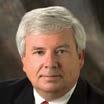
Now, when you think that some of our predecessors on the soil of what we call our state have been here for thousands and thousands of years (the date being pushed back all the time), then the five years of the Two Mississippi Museums is just a flash.

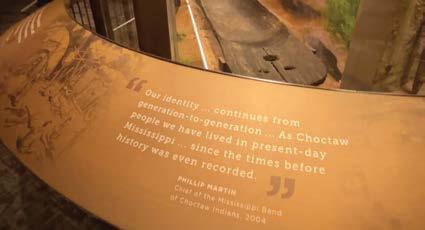 Walt Grayson is the host of “Mississippi Roads” on Mississippi Public Broadcasting television and the author of two “Looking Around Mississippi” books and “Oh! That Reminds Me: More Mississippi Homegrown Stories.” Walt is also a reporter and 4 p.m. news anchor at WJTV in Jackson. He lives in Brandon and is a Central Electric member. Contact him at walt@waltgrayson.com.
Walt Grayson is the host of “Mississippi Roads” on Mississippi Public Broadcasting television and the author of two “Looking Around Mississippi” books and “Oh! That Reminds Me: More Mississippi Homegrown Stories.” Walt is also a reporter and 4 p.m. news anchor at WJTV in Jackson. He lives in Brandon and is a Central Electric member. Contact him at walt@waltgrayson.com.
I found out how long people have been here. We have Native American mounds older than the Pyramids here in Mississippi.




